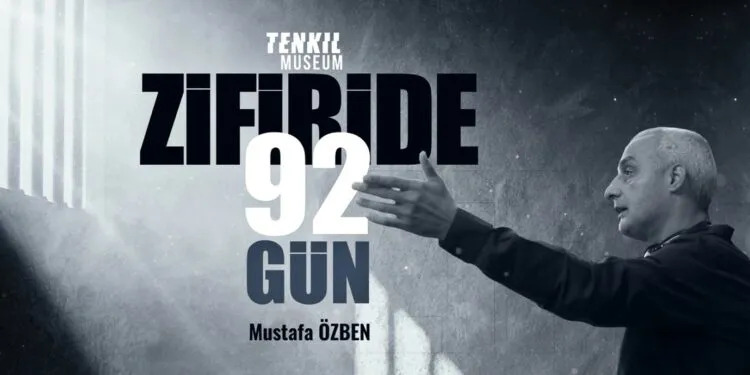Mustafa Özben, a lawyer who was missing for 92 days in Turkey and later revealed to have been abducted by the National Intelligence Organization (MİT), explains what he went through in a new documentary premiering on December 2, the Stockholm Center for Freedom reported.
Titled “92 Days in Pitch Black,” the movie was filmed in a former Gestapo prison in western Germany as part of a documentary series launched by the Tenkil Museum, an initiative dedicated to documenting the individual tragedies of Turkey’s post-coup purges after 2016.
In the documentary Özben talks about the 92 days he spent being interrogated under torture at the hands of MİT and what happened afterward.
“I seek justice, not revenge,” Özben said.
Reported missing in Ankara in May 2017, Özben had disappeared after dropping his daughter at school. Family members located his abandoned car and found eyewitnesses who reported that they saw a man being pushed into a van by three men, one of whom was wearing a black ski mask.
Yet Özben’s family said the police seemed generally unwilling to investigate and that the witness statements they were able to gather were not fully entered into police records.
Özben is one of the few dozen people who were reported missing in the aftermath of a failed military coup in July 2016. The alleged abductees were typically people under investigation, on trial or convicted of alleged links to the faith-based Gülen movement, and they sometimes later resurfaced in police custody or in court hearings as witnesses denouncing other members of the movement.
Some have claimed that MİT operates a secret detention center in Ankara where abducted political opponents are unofficially subjected to brutal interrogations.
Family members of those who turned up reported significant physical and mental weakening of their loved ones who were willing to sign self-incriminating confessions. They also urged their family members to drop any complaints filed with the European Court of Human Rights or United Nations bodies.
Some victims, such as former Defense Ministry employee Yusuf Bilge Tunç, who was reported missing in August 2019, remain unaccounted for.
The alleged abductions were seen by human rights groups as the return to the country of enforced disappearances, a practice that in the 1980s and 1990s wreaked havoc in the predominantly Kurdish east and southeast with the disappearance in police custody of hundreds of civilians.
Turkish President Recep Tayyip Erdoğan has been targeting followers of the Gülen movement, inspired by Turkish Muslim cleric Fethullah Gülen, since the 2013 corruption investigations, which implicated then-prime minister Erdoğan, his family members and his inner circle.
Dismissing the investigations as a Gülenist coup and conspiracy against his government, Erdoğan designated the movement as a terrorist organization and began to target its members. He intensified the crackdown on the movement following the abortive putsch in 2016 that he accused Gülen of masterminding. Gülen and the movement strongly deny involvement in the coup attempt or any terrorist activity.
In addition to the thousands who were jailed, scores of other Gülen movement followers had to flee Turkey to avoid the government crackdown.



